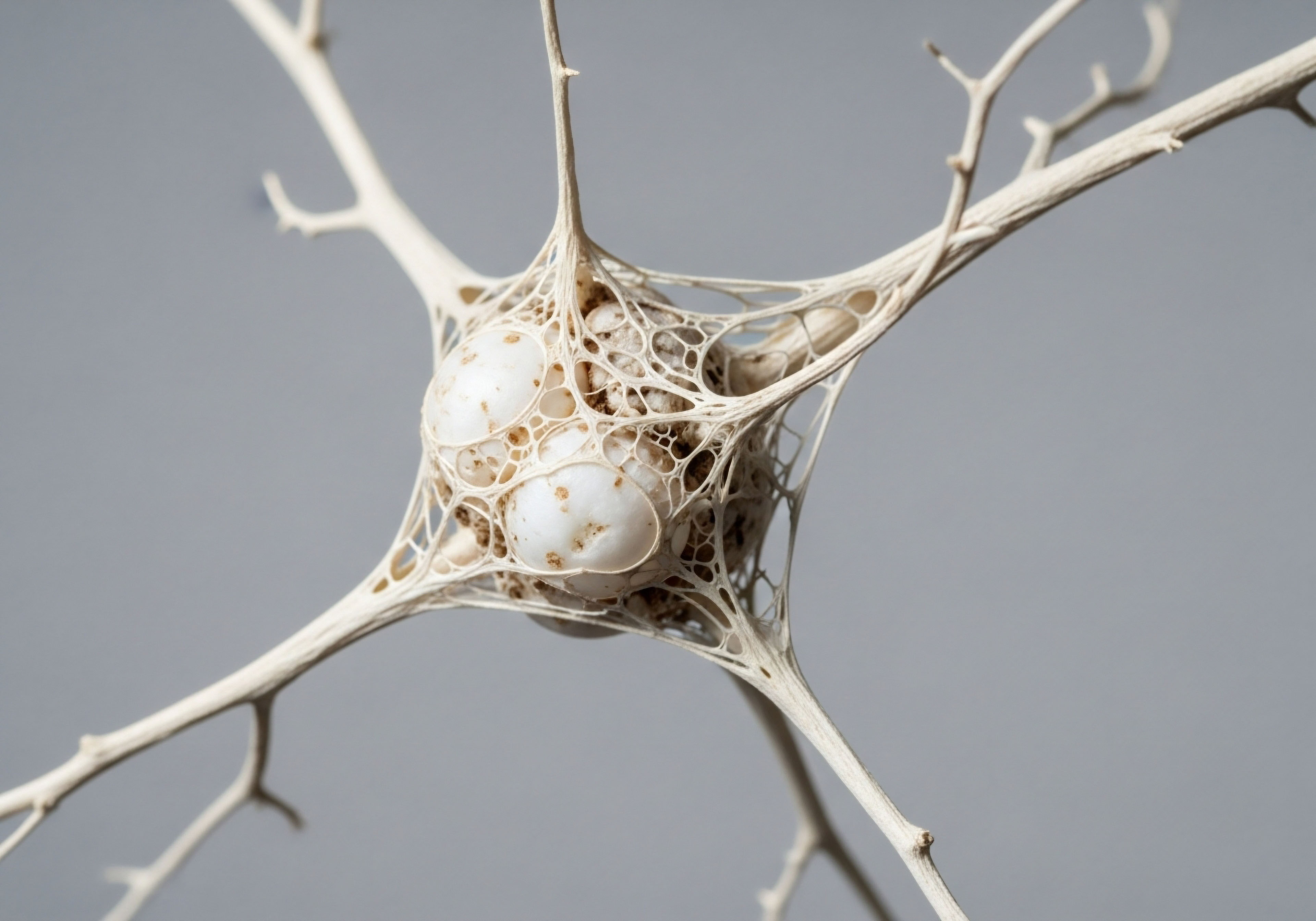

Fundamentals
You feel it long before a lab test gives it a name. A persistent fatigue that sleep doesn’t touch, a mental fog that obscures clarity, and a subtle chill that seems to emanate from within. These experiences are valid, tangible signals from a sophisticated internal communication network where the thyroid gland plays a central role.
Understanding this system is the first step toward reclaiming your vitality. Your body produces a primary thyroid hormone called thyroxine, or T4. Think of T4 as a well-written message that has been sealed in an envelope. For its instructions to be read and carried out by your cells, it must be opened.
This “opening” is a conversion process that transforms T4 into the biologically active hormone triiodothyronine, or T3. The efficiency of this conversion dictates how much energy your cells can produce, how sharp your thoughts are, and how well you regulate your internal temperature.
The entire architecture of your well-being is profoundly influenced by this single biochemical step. When the conversion from T4 to T3 is inefficient, it is akin to having a stack of unopened mail; the messages are there, but their vital instructions remain inaccessible.
This can lead to the frustrating clinical picture of “normal” T4 levels coexisting with all the symptoms of an underactive thyroid. The body is producing the messages, yet it struggles to read them. This is where the internal environment, particularly the health of your gut, becomes a key protagonist in your personal health story.
The gut is not merely a digestive tube; it is a complex ecosystem that hosts trillions of microorganisms, collectively known as the gut microbiota. This internal garden has a far-reaching influence, extending to the intricate processes of hormonal regulation.
The conversion of inactive T4 thyroid hormone to its active T3 form is a critical metabolic process directly impacting cellular energy and function.
Recent scientific inquiry has begun to map the fascinating connections between the gut microbiome and thyroid function, revealing a relationship of profound significance. A healthy gut environment, rich in beneficial bacteria, supports the delicate enzymatic processes required for optimal T4 to T3 conversion.
Conversely, an imbalanced gut, a state known as dysbiosis, can disrupt this process, contributing to the very symptoms that diminish your quality of life. The microorganisms residing in your intestines are active participants in your endocrine health. They influence the absorption of essential micronutrients like selenium and zinc, which are indispensable cofactors for the deiodinase enzymes that drive T4 to T3 conversion.
A disruption in the gut can therefore create a bottleneck in your thyroid hormone pathway, leaving you with ample raw material (T4) but a scarcity of the finished product (T3) that your cells desperately need.
This recognition of the thyroid-gut axis reframes the conversation about thyroid health. It moves the focus from a simple gland-centric model to a more holistic, systems-based understanding of your body. Your journey toward hormonal balance involves looking beyond the thyroid itself and considering the health of the entire ecosystem within.
By acknowledging the lived experience of your symptoms and connecting them to the underlying biological mechanisms, you gain the power to ask more precise questions and seek more comprehensive solutions. The path to wellness begins with this deeper awareness of your own internal biology.


Intermediate
To appreciate how specific probiotic strains can influence thyroid hormone conversion, we must first examine the primary mechanism governing this process ∞ the deiodinase enzymes. These enzymes are the skilled technicians of the endocrine system, responsible for selectively removing iodine atoms from the T4 molecule to create the more potent T3.
There are three main types of deiodinase enzymes (D1, D2, and D3), and their activity is distributed throughout the body’s tissues. D1 and D2 are the primary activators, converting T4 to T3, while D3 acts as a deactivator, converting T4 into reverse T3 (rT3), an inactive form.
The balance of activity between these enzymes is a critical control point for metabolic regulation. An efficient system favors the production of T3, ensuring cells have the hormonal signal needed to maintain energetic function.
The gut microbiota enters this equation as a significant modulator of deiodinase activity and overall thyroid hormone economy. Approximately 20% of T4 to T3 conversion is thought to occur in the gastrointestinal tract, influenced by the enzymatic activity of gut bacteria.
Certain bacterial species produce enzymes, such as intestinal sulfatases, that can cleave sulfate and glucuronide molecules from thyroid hormone metabolites that have been processed by the liver. This action liberates them for reabsorption back into circulation, a process known as enterohepatic circulation.
A healthy microbiome essentially recycles and reactivates thyroid hormones that would otherwise be excreted, thereby increasing the body’s available pool of active T3. When the gut environment is compromised, this recycling pathway is impaired, leading to a net loss of thyroid hormone and potentially contributing to a hypothyroid state at the cellular level, even if blood levels of T4 appear adequate.

Which Probiotic Families Show Therapeutic Potential?
Research into the thyroid-gut axis has identified several families of probiotic bacteria that appear to play a beneficial role in supporting thyroid function. The two most extensively studied groups are Lactobacillus and Bifidobacterium. These bacteria are known for their ability to support the integrity of the intestinal barrier, modulate immune responses, and reduce systemic inflammation ∞ all of which are factors that can indirectly support efficient thyroid hormone conversion.
- Lactobacillus ∞ Strains within this genus, such as Lactobacillus reuteri, have been shown in animal studies to improve thyroid function, leading to increased T4 levels and a more robust thyroid gland. The proposed mechanism involves the modulation of the immune system, specifically by enhancing the activity of regulatory T-cells, which helps to quell the chronic inflammation that can suppress deiodinase activity.
- Bifidobacterium ∞ This genus is another cornerstone of a healthy gut microbiome. Studies have noted a decreased abundance of Bifidobacterium in individuals with thyroid disorders. Supplementation with these probiotics, often in combination with Lactobacillus, has been associated with improved thyroid stimulating hormone (TSH) levels, suggesting a more balanced feedback loop within the hypothalamic-pituitary-thyroid (HPT) axis.
The gut microbiota directly participates in thyroid hormone regulation by facilitating the conversion of T4 to T3 through bacterial enzymes and by supporting the enterohepatic circulation of hormones.
The therapeutic action of these probiotics extends beyond direct enzymatic activity. They are instrumental in improving the absorption of key minerals required for thyroid health. The table below outlines the essential micronutrients and the role a healthy gut plays in their bioavailability.
| Micronutrient | Role in Thyroid Function | Influence of Gut Microbiota |
|---|---|---|
| Selenium | Acts as a critical cofactor for deiodinase enzymes. | A healthy gut microbiome enhances the absorption and bioavailability of dietary selenium. |
| Zinc | Required for the synthesis of TSH and the function of deiodinase enzymes. | Probiotics can improve gut acidity and enzyme function, facilitating better zinc absorption. |
| Iron | Necessary for the production of thyroid hormones. Iron deficiency can impair conversion. | Gut bacteria can influence iron absorption and storage, preventing deficiencies that impact thyroid health. |

How Do Probiotics Influence the Hypothalamic Pituitary Thyroid Axis?
The influence of probiotics is not confined to the gut; it extends to the central command system of the endocrine network, the Hypothalamic-Pituitary-Thyroid (HPT) axis. This axis operates on a sophisticated feedback loop. The hypothalamus releases thyrotropin-releasing hormone (TRH), which signals the pituitary to release thyroid-stimulating hormone (TSH).
TSH, in turn, instructs the thyroid gland to produce T4 and T3. When circulating thyroid hormone levels are sufficient, they signal back to the hypothalamus and pituitary to decrease TRH and TSH production, maintaining a state of equilibrium. Chronic inflammation, often originating from gut dysbiosis, can interfere with this delicate signaling.
Inflammatory molecules called cytokines can suppress the HPT axis, leading to reduced TSH output and consequently, lower thyroid hormone production. By restoring gut barrier function and reducing the systemic inflammatory load, specific probiotic strains can help normalize HPT axis communication. This recalibration allows the body’s natural feedback mechanisms to function as intended, leading to more stable and appropriate levels of thyroid hormone production and conversion.


Academic
A sophisticated analysis of thyroid hormone homeostasis reveals its profound dependency on extrathyroidal factors, particularly the biochemical crucible of the gut microbiome. The conversion of thyroxine (T4) to the metabolically potent triiodothyronine (T3) is catalyzed by a family of selenoenzymes known as iodothyronine deiodinases.
While the liver and kidneys are primary sites for this bioactivation, the intestinal lumen has emerged as a critical, yet often overlooked, theater of operations. The gut microbiota contributes to the systemic thyroid hormone pool through at least two primary vectors ∞ direct enzymatic action on hormone conjugates and indirect modulation of the systemic inflammatory and nutrient-absorptive milieu.
A quantitative assessment suggests that up to 20% of T3 is generated peripherally through the action of microbial enzymes, underscoring the gastrointestinal tract’s role as a significant endocrine-modulating organ.
The liver conjugates thyroid hormones, primarily through glucuronidation and sulfation, to facilitate their biliary excretion. These conjugated forms are biologically inert. However, certain commensal bacteria within the gut, including specific strains of Lactobacillus and Bifidobacterium, produce glucuronidase and sulfatase enzymes.
These microbial enzymes effectively deconjugate the inert hormone metabolites, liberating free T4 and T3 for reabsorption via the enterohepatic circulation. This bacterial-mediated salvage pathway constitutes a vital component of thyroid hormone economy. In a state of eubiosis, this mechanism enhances the half-life and bioavailability of thyroid hormones.
In dysbiosis, a reduction in the populations of these beneficial bacteria leads to a diminished recycling capacity, resulting in a net fecal loss of thyroid hormone precursors and a potential contributor to subclinical or overt hypothyroidism.

What Is the Role of Lipopolysaccharides in Thyroid Function?
A deeper mechanistic dive reveals the immunological consequences of gut dysbiosis on thyroid function, particularly through the action of lipopolysaccharides (LPS). LPS, a component of the outer membrane of gram-negative bacteria, is a potent endotoxin. A compromised intestinal barrier, or “leaky gut,” permits the translocation of LPS from the gut lumen into systemic circulation, a condition known as metabolic endotoxemia.
This triggers a cascade of inflammatory responses, primarily through the activation of Toll-like receptor 4 (TLR4). The resulting pro-inflammatory cytokines, such as tumor necrosis factor-alpha (TNF-α) and interleukin-6 (IL-6), have been demonstrated to exert a suppressive effect on the activity of type 1 deiodinase (D1), the enzyme prevalent in the liver and kidneys.
Furthermore, these inflammatory signals can downregulate the expression of the sodium-iodide symporter (NIS) in the thyroid gland, impairing the uptake of iodine, an essential substrate for hormone synthesis. Probiotic strains that enhance intestinal barrier integrity, such as Lactobacillus rhamnosus, can mitigate LPS translocation, thereby reducing the systemic inflammatory tone and preserving the functional capacity of the thyroid axis.
Bacterial lipopolysaccharides from a dysbiotic gut can systemically suppress the deiodinase enzymes responsible for activating thyroid hormone.
The table below provides a comparative analysis of the mechanisms through which specific probiotic genera are hypothesized to influence thyroid hormone metabolism.
| Probiotic Genus | Primary Mechanism of Action | Biochemical Outcome |
|---|---|---|
| Lactobacillus | Enhances intestinal barrier function; produces short-chain fatty acids (SCFAs); modulates regulatory T-cell activity. | Reduced LPS translocation; decreased systemic inflammation; improved mineral absorption; potential for enhanced D1/D2 enzyme efficiency. |
| Bifidobacterium | Produces SCFAs, particularly butyrate; cross-feeds with other beneficial bacteria; supports immune tolerance. | Nourishes colonocytes to strengthen gut barrier; reduces inflammatory cytokine production; may improve HPT axis sensitivity. |
The interplay between the gut microbiome and thyroid health also extends to the synthesis and utilization of short-chain fatty acids (SCFAs), such as butyrate, propionate, and acetate. These molecules are the metabolic byproducts of bacterial fermentation of dietary fiber.
Butyrate, in particular, serves as the primary energy source for colonocytes, the cells lining the colon, thereby playing a direct role in maintaining intestinal barrier integrity. Beyond this structural role, SCFAs function as signaling molecules. They can influence the expression of genes related to inflammation and immunity.
For instance, butyrate has been shown to have histone deacetylase (HDAC) inhibitory activity, which can lead to an anti-inflammatory phenotype. By creating an environment rich in SCFAs, probiotic species indirectly support thyroid function by fortifying the gut barrier, reducing the inflammatory pressures that suppress deiodinase activity, and contributing to overall metabolic health, which is intrinsically linked to endocrine balance.
- Nutrient Bioavailability ∞ Probiotic fermentation can alter the pH of the gut, which enhances the solubility and subsequent absorption of key minerals like selenium, zinc, and iron, all of which are indispensable for thyroid peroxidase (TPO) and deiodinase function.
- Immune Modulation ∞ Certain probiotic strains can shift the balance of T-helper cells away from a pro-inflammatory Th17 response toward a more tolerogenic regulatory T-cell (Treg) response, which is particularly relevant in the context of autoimmune thyroiditis.
- Hormone Synthesis ∞ While indirect, the reduction of oxidative stress and inflammation by a healthy microbiome creates a more favorable systemic environment for the entire lifecycle of thyroid hormones, from synthesis in the gland to peripheral conversion and cellular uptake.

References
- Spaggiari, G. et al. “Probiotics Ingestion Does Not Directly Affect Thyroid Hormonal Parameters in Hypothyroid Patients on Levothyroxine Treatment.” Frontiers in Endocrinology, vol. 8, 2017, p. 316.
- Fröhlich, E. and R. Wahl. “Thyroid-Gut-Axis ∞ How Does the Microbiota Influence Thyroid Function?” Nutrients, vol. 11, no. 8, 2019, p. 1769.
- Knezevic, J. et al. “Thyroid-Gut Axis ∞ How Does the Microbiota Influence Thyroid Function?” Nutrients, vol. 12, no. 6, 2020, p. 1769.
- Ishaq, H. M. et al. “Gut microbiota and its association with thyroid disorders.” Journal of the College of Physicians and Surgeons Pakistan, vol. 27, no. 11, 2017, pp. 714-718.
- Chen, Y. et al. “Relationship between gut microbiota and thyroid function ∞ a two-sample Mendelian randomization study.” Frontiers in Endocrinology, vol. 14, 2023, p. 1243779.
- Su, A. et al. “Effect of probiotics or prebiotics on thyroid function ∞ A meta-analysis of eight randomized controlled trials.” PLoS ONE, vol. 19, no. 1, 2024, e0296733.
- Virili, C. and M. Centanni. “‘With a little help from my friends’ ∞ The role of microbiota in thyroid hormone metabolism and enterohepatic recycling.” Molecular and Cellular Endocrinology, vol. 458, 2017, pp. 1-7.
- Babić Leko, M. et al. “Evaluation of Neuro-Hormonal Dynamics after the Administration of Probiotic Microbial Strains in a Murine Model of Hyperthyroidism.” International Journal of Molecular Sciences, vol. 25, no. 7, 2024, p. 4016.

Reflection
The information presented here marks the beginning of a deeper inquiry into your own unique biological system. The connection between the gut and the thyroid is a powerful illustration of the body’s interconnectedness, a reminder that symptoms rarely arise from a single, isolated point of failure.
Instead, they are signals from a complex, integrated network. Your personal health narrative is written in the language of these signals. Learning to interpret them, to connect the feeling of fatigue to the cellular process of hormone conversion, is the foundational act of self-advocacy.
This knowledge transforms you from a passive recipient of symptoms into an active participant in your own wellness. The next step is to consider how these systems function within the context of your own life. What is your internal ecosystem communicating to you, and how can you begin to nurture it back into balance?



